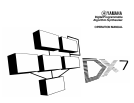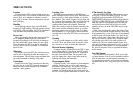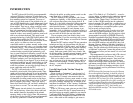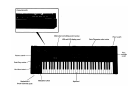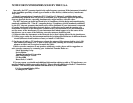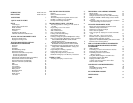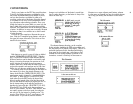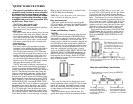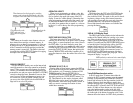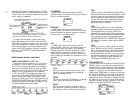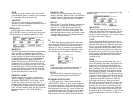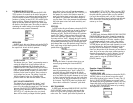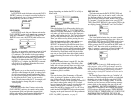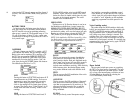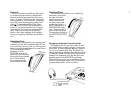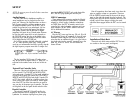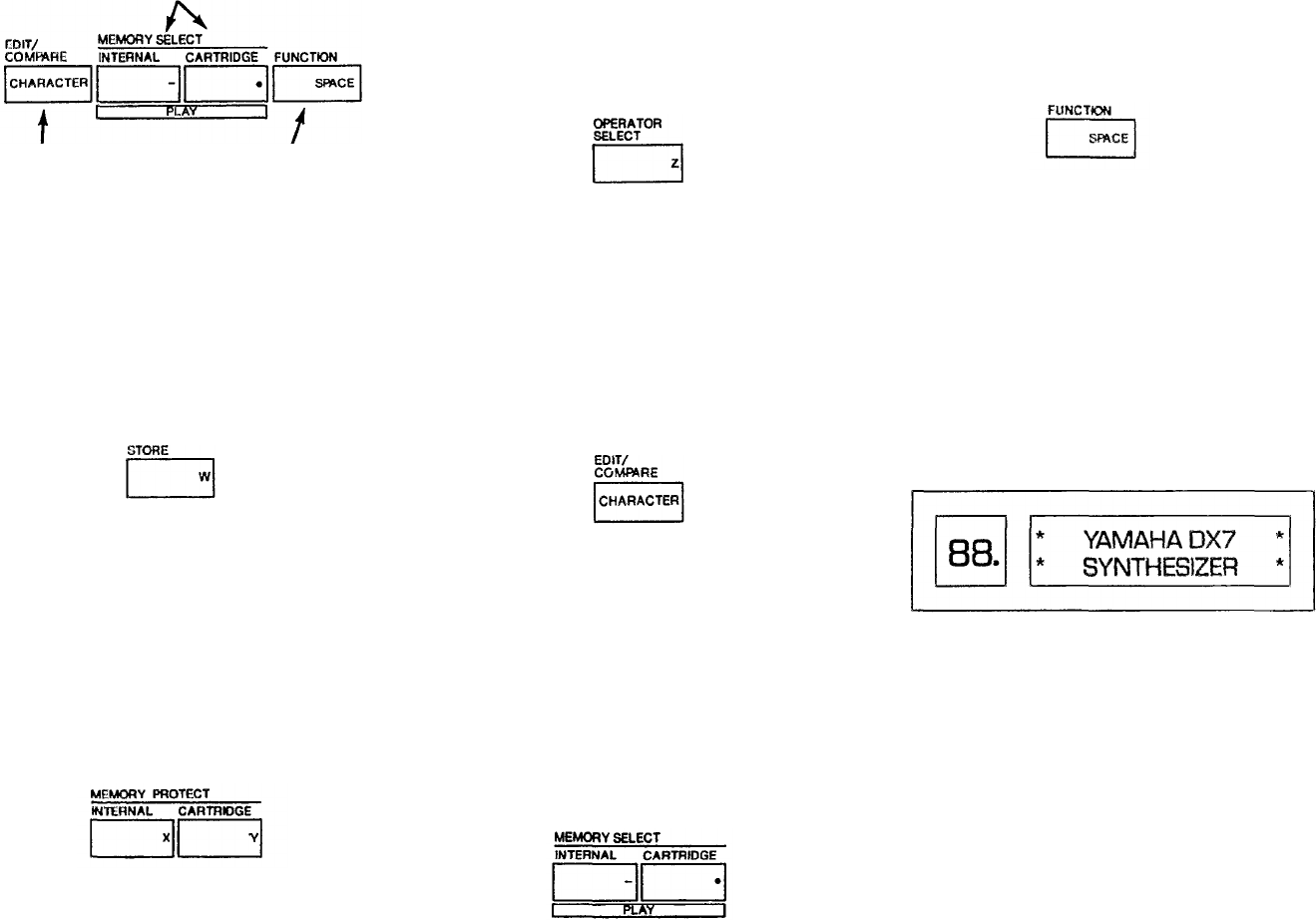
These buttons select the internal or cartridge
memory and activate the PLAY mode; they also
designate where individual voices may be stored
This button selects the
EDIT mode and com-
pares edited to original
voices
This button selects the
FUNCTION mode
STORE
This button can be used to store whatever voice you
have selected from cartridge or internal memory, or
whatever voice you have just programmed. A voice can
be stored into any of 32 internal memories or into any
of the 32 memories in a RAM cartridge (provided the
memory protect is turned off). This button is also used
in conjunction with the [EG COPY] buttons for copying
envelopes from one operator to another.
MEMORY PROTECT
This pair of buttons enable you to set the internal and
cartridge memories so that voices cannot be accidentally
erased. When you press one of the buttons, the display
shows you whether the associated memories are
controls to change the status. Remember, however, that
even if you turn off the cartridge memory protect, you
still cannot save a voice on a ROM cartridge, nor can
you save a voice if the On/Off switch on the RAM car-
tidge itself is set to the ON position.
OPERATOR SELECT
When you are programming or editing a voice, this
button lets you select the operator which is to be modi-
fied, as shown in the upper right corner of the LCD
display. (It sets the "current operator".) Remember that
some programming parameters affect the overall voice,
in which case this button will have no effect. You can
only select from operators that are turned on, as shown
by the six 1's or 0's in the top line of the programming
display.
EDIT/COMPARE-CHARACTER
This button places the DX7 in the EDIT mode,
wherein you can edit any of the preset voices to change
them slightly, or create completely new voices. Once in
the EDIT mode, if you have changed a preset, then
pressing this button lets you compare the edited version
with the original. Once in the EDIT mode, if you have
pressed the [VOICE NAME] button, then pressing this
button [CHARACTER] and holding it enables you to
press other buttons to enter the name of the voice in the
display
MEMORY SELECT- PLAY
Pressing either of these buttons prepares the DX7 to
PLAY any of the voices that are stored in the 32 INTER-
NAL memories, or in 32 memories of whatever CAR-
TRIDGE is installed. Once the [INTERNAL] or
[CARTRIDGE] source is designated, specific voices are
accessed by pressing the VOICE SELECT buttons [1] to
[32]. These buttons are also used to designate where
individual voices can be stored, in the internal or car-
tridge memories, either after being created or edited, or
when you want to rearrange the location of voices
within these memories.
FUNCTION
This button places the DX7 in the FUNCTION mode,
which is used to program the entire keyboard rather
than individual voices. This mode is also used for check-
ing battery voltage, storing all the internal memories
onto cartridge at once, and vice-versa, and a few other
specialized functions. The functions designated by
brown labels beneath other buttons are available after
pressing this button.
LED & LCD Display Panel
The LED (Light Emitting Diode) window indicates the
number of the selected internal or cartridge voice mem-
ory. If the voice being played is in the midst of being
edited, a decimal point appears to the right of the voice
number. If you then press the [EDIT/COMPARE] button
to hear the original voice before the editing, the LED
numbers blink on and off. The LCD (Liquid Crystal
Display) window displays the current status of the syn-
thesizer, which may be the voice name and source, or
the FUNCTION or EDIT mode parameter which was
most recently selected. Refer to the paragraph "How to
interpret the display," on page 28.
LCD synthesizer stains and voice name display
Voice number LED display
Voice/Edit/Function select section
In PLAY mode. these 32 buttons select either the
voices in the DX7's internal memory or on the external
cartridge, as determined by the [MEMORY SELECT]
buttons and indicated by the large numbers inside the
buttons. However, these same buttons actually have
multiple functions (up to 5 per button) which are accessi-
ble when the DX7 is placed in the FUNCTION and EDIT
modes. All labels on these buttons are color and posi-
tion coded: white numbers on the inside left of the
buttons for PLAY mode, dark brown (reversed) type on
the inside right of the buttons for naming voices, violet
characters above the buttons for EDIT mode parameters,
5
protected or not, and you can use the [DAT A ENTRY]



